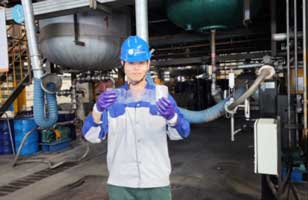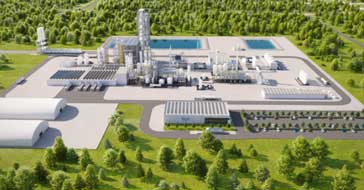Green tie-ups: Chinese companies/KAUST to develop PCs made from CO2; SK Geo Centric/Plastic Energy to establish 2nd pyrolysis plant in South Korea

King Abdullah University of Science and Technology (KAUST) and two Chinese companies operating in the plastics sector: Shandong Lianxin Environmental Protection Technology Co. and Hangzhou Hecai Technology have agreed to develop environmentally friendly "green plastics" called aliphatic polycarbonates (PCs).
Shandong Lianxin Environmental Protection envisions targeting the biomedical products and food packaging sectors. These applications prioritise biodegradability, low toxicity, and excellent biocompatibility characteristics.
Ibn Al-Aytham Distinguished Professor of Chemistry Yves Gnanou, Dr. Xiaoshuang Feng, and their research team at KAUST have developed an innovative method that allows them to create these polycarbonates without using toxic metals, which are typically used in the production of similar plastics. These polycarbonates are unique because they are made using carbon dioxide (CO2) and raw materials from sustainable sources.
The projected timescale is two years to full commercialisation, with the next year spent building the facility and producing 1 tonne of the material.
Dr. Feng explains that regular polycarbonates made with metal catalysts cannot be used in applications like food or medical products because of the metals they contain. However, the CO2-PC is free of metals and an excellent barrier to oxygen and moisture, making it the perfect plastic for packaging items that need to be protected from oxidation, and a top-quality material for high-end applications.
Further, since it includes up to 45% of CO2, the products help reduce carbon footprint when manufactured.
In early 2023, the two Chinese companies expressed interest in bringing KAUST's polycarbonates to the market in a phased manner. In the initial phase, Hangzhou Hecai Technology Co will provide the facilities to scale the synthesis of polycarbonates up to 10 kg using KAUST's proprietary protocol. In the subsequent phase, Shandong Lianxin Environmental Protection Technology will leverage its extensive industrial capabilities to pilot the production of high molar mass polycarbonates, aiming for a 1-tonne output before full-scale industrialisation.
Professor Gnanou comments, "I began contemplating biodegradable plastics several years ago, and I'm gratified that we've developed a material that can be completely converted into water and CO2 through enzymatic degradation at the end of its lifecycle. Our product won't add to the environmental challenge."
Established in 2009, KAUST is a graduate research university devoted to finding solutions for some of the world's most pressing scientific and technological challenges in the areas of food and health, water, energy, environment, and the digital domain.

In other news, SK Geo Centric, a subsidiary of SK Innovation, has tied up with Plastic Energy, the UK-based plastic pyrolysis specialist, to build a waste plastic pyrolysis plant in Dangjin, Chungcheongnam-do province. The plant will have a waste processing capacity of 66,000 tonnes/year.
The plant is the second domestic pyrolysis plant after the Ulsan ARC (Advanced Recycling Cluster), which is under construction in the southern district of Ulsan with the targeted operation in 2025.
The two companies signed a Memorandum of Understanding (MOU) for the construction of the pyrolysis plant 2 in Frankfurt, Germany recently.
According to the MOU, the companies will establish a joint venture and construct a pyrolysis facility in the Songsan-2 Foreign Investment Zone in Dangjin. The specific timeline for construction and plant operation will be determined through future discussions between the two companies.
As the second plant will be located near the Seoul metropolitan area and Chungcheong regions, not only will its locational feature facilitate efficient waste collection from these areas, there is also the potential connection with the Ulsan ARC. The pyrolysis oil produced at plant 2 is expected to be further refined at the Ulsan ARC's pyrolysis oil post-treatment facility for use in petrochemical processes.
Pyrolysis oil is created by heating waste plastics and discarded vinyl at high temperatures, and it is considered a crude oil substitute. Therefore, it is regarded as a crucial element in the circular economy for waste plastics, as it can be used in petrochemical processes to produce new petrochemical products.
Last year, SK Geo Centric continued its collaborative relationship with Plastic Energy by signing a Heads of Agreement (HOA) for the construction of a waste plastic pyrolysis plant in the Ulsan ARC.
Building on Plastic Energy's experience in operating stable pyrolysis plants in places including Seville, Spain, and its accumulated technology patents, the partnership aims to further circular economy for waste plastics in South Korea.
SK Geo Centric CEO Na Kyung-soo said, "Following Ulsan, operating a waste plastic pyrolysis plant in Dangjin will significantly contribute to establishing a circular economy system in Korea." He added, "We will continue to make the best efforts to establish a circular economy for waste plastics in order to fulfill our goal to recycle an amount of plastic equivalent to what SK Geo Centric has produced by 2027."
(PRA)
Subscribe to Get the Latest Updates from PRA Please click here
©2023 Plastics and Rubber Asia. All rights reserved.

©2023 Plastics and Rubber Asia. All rights reserved.
Home Terms & Conditions Privacy Policy Webmail Site Map About Us

















